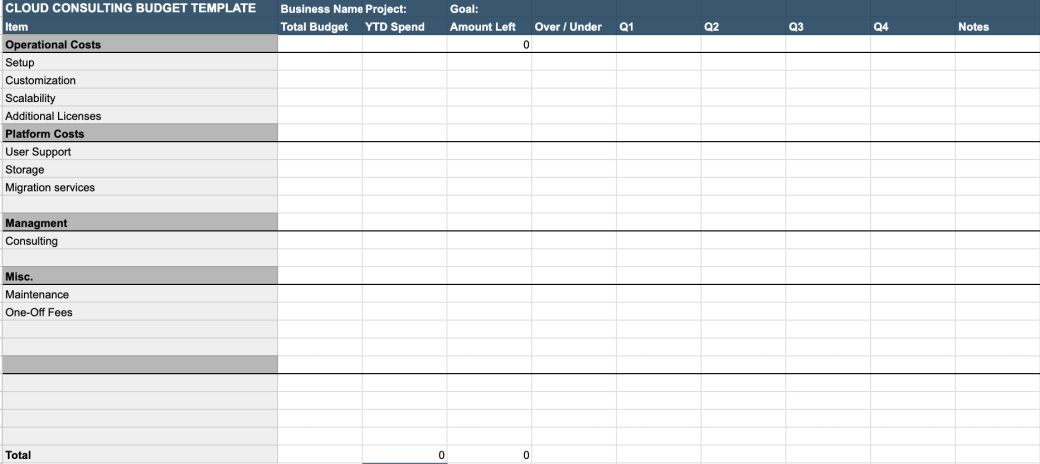

Updated December 3, 2025
As businesses increasingly move their operations to the cloud, the demand for cloud consulting services has skyrocketed. Learn how to create a budget for hiring the right cloud resources for your business.
Businesses that are concerned about the future growth of their company should invest in cloud computing projects for safety and storage. But what goes into managing cloud costs?
When it comes to development projects, one of the most important factors to consider is budget. This is especially true when it comes to building cloud-based applications and systems. There are a number of unique costs associated with cloud strategy and builds.
However, working with a cloud provider can help with the grunt work as long as your team crafts a budget that works well with your business needs and expectations for cloud computing services.
Cloud spending can add up, which is why a budget is important to save costs.
Creating a budget for cloud consulting services involves several key factors that need to be considered. Here are some elements that typically go into a cloud consulting services budget:
Setting up goals is crucial for creating a cloud computing budget.
By understanding what you aim to achieve, you can identify the specific resources, services, and technologies required to meet those goals. This enables more accurate cost estimation for the cloud computing budget.
Goals assist in allocating resources effectively. Once you have defined your objectives, you can assess the resources, including finances, personnel, and infrastructure, needed to accomplish those goals.
This enables you to allocate the appropriate budget to each aspect of your cloud computing project based on its importance and impact on achieving the goals.
Defining the scope of a cloud computing project ensures that your budget will remain streamlined and straightforward. Having an idea of the workloads for your cloud computing and internal teams will make the plan for the project organized and clear.
The scope of the project determines which cloud platform to use, what maintenance support you’ll need, the type of functionality you’re looking for, and other factors that impact the overall cost.
For example, if your business goals include using Kubernetes for cloud adoption and deployment, then your cloud service provider will need a specific set of tools and technologies to make that happen.
Defining the project scope for a cloud computing service is important as it provides clarity, helps in resource allocation and budget control, manages risks, aligns stakeholders, and ensures adherence to timelines.
Exploring cloud solutions can indeed assist in creating a budget for cloud consulting
Cloud solutions often provide cost savings compared to traditional on-premises infrastructure. By exploring cloud options, businesses can identify cost-effective services and technologies that align with their consulting needs. This enables more accurate budgeting by considering the potential savings associated with cloud adoption.
Some popular cloud solutions are:
Your cloud computing provider can help your business identify which category of cloud solution (multi-cloud vs private vs public cloud) works best for you. They can provide guidance on which works best for scalability, optimization, storage, and other factors with an idea of total cost.
When budgeting for a cloud computing project, it’s important to think about long-term and short-term costs. This is also impacted by the pricing model you choose to use with your cloud consulting provider.
For example, if you’re in a pay-as-you-go pricing plan, you’ll need to factor in any additional resources and support as your user base or storage needs grow. Thinking about the future is important as well when planning the budget. This might not happen in the near future, but consider the cost of cloud migration if your business needs ever change.
When using cloud consulting services, there will be direct costs charged by your service provider, indirect costs that incur over time, operational costs for day-to-day support, and scalability costs.
Considering these different types of costs when crafting a budget for cloud consulting services, you can develop a more accurate financial plan, make informed decisions, and avoid unexpected financial surprises throughout the implementation and management of your cloud infrastructure.
Hiring a cloud consulting service provider brings expertise, cost optimization strategies, scalability planning, strategic guidance, and risk mitigation to your budget planning for cloud consulting support.
Their knowledge and experience enable you to make informed decisions, optimize expenses, and effectively manage your cloud investments within your budgetary constraints.
There are different costs associated with hiring a cloud consulting service provider, like the scope of services, additional support, cloud resources, project duration, and more.
It's important to note that the exact costs associated with hiring cloud computing support can vary based on factors such as the chosen provider, the scope of services required, and the specific needs of the business. It is advisable to consult with cloud service providers or engage with a cloud consulting firm to get a precise estimate tailored to your organization's requirements and what can fit your business budget.
Use our free template to help your team budget for cloud consulting support. All cloud consulting needs vary, so use this as a starting point for your organization.
Plan your cloud consulting budget according to your business priorities and computing resource needs.

Download your budget for cloud consulting services.
Consider the following factors when creating a budget for cloud computing services:
Remember, the cost factors for cloud consulting can vary depending on the specific project, provider, and other circumstances. It's advisable to discuss your requirements with potential consulting firms to get accurate pricing estimates based on your unique needs.
Learn about cloud pricing with our guide for hiring cloud service providers.
By considering key factors such as project scope, technical expertise required, ongoing support, and monitoring, businesses can develop a cloud consulting budget that strikes the right balance between cost efficiency and accessing high-quality expertise.
With careful planning, businesses can maximize their value with an organized budget for cloud computing services.
Explore your choices for the top cloud computing services on Clutch.


